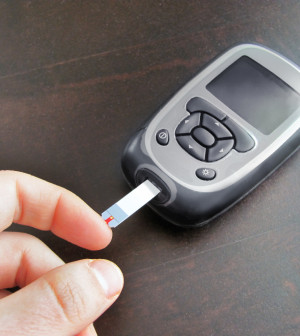- Could Your Grocery Store Meat Be Causing Recurring UTIs?
- Are You Making This Expensive Thermostat Error This Winter?
- Recognizing the Signs of Hypothyroidism
- 10 Strategies to Overcome Insomnia
- Could Artificial Sweeteners Be Aging the Brain Faster?
- Techniques for Soothing Your Nervous System
- Does the Water in Your House Smell Funny? Here’s Why
- Can a Daily Dose of Apple Cider Vinegar Actually Aid Weight Loss?
- 6 Health Beverages That Can Actually Spike Your Blood Sugar
- Treatment Options for Social Anxiety Disorder
FDA Panel Mulls Worth of Steroid Shots For Back Pain


An expert advisory panel of the U.S. Food and Drug Administration will decide Tuesday whether to recommend that doctors stop giving steroid injections for back pain.
These shots are commonly used to treat back pain, but they are not approved for this use and whether the risks outweigh the benefits is a matter of debate.
According to the FDA, serious but rare side effects with these shots can include death, spinal cord blockage, paralysis, blindness, stroke, seizures, nerve injury and brain swelling.
And experts are divided on whether steroid shots actually ease back pain.
A study published earlier this year in the New England Journal of Medicine found that people who have lower back pain caused by spinal stenosis — a common condition among those over the age of 60 in which the open space in the spinal canal narrows from inflammation — are unlikely to get relief from steroid shots.
Study author Dr. Janna Friedly, an assistant professor of rehabilitation medicine at the University of Washington in Seattle, said at the time that, “These steroid injections aren’t helpful. There is no added benefit to the steroid itself, so if people are considering these injections, I would recommend that they consider an alternative.”
However, Dr. Houman Danesh, a specialist in pain management and rehabilitation and physical medicine at Mount Sinai Hospital in New York City, said he believes these injections are both safe and effective.
“Steroid injections have been practiced longer than we have had a vaccine for polio, and after six decades the FDA has decided to review the safety and efficacy of these injections,” he noted.
Danesh thinks the FDA’s current interest is based on an incident in 2012, when more than 700 people contracted fungal meningitis and other infections that resulted in more than 60 deaths, all the result of a single compounding pharmacy distributing steroids contaminated with a fungus that caused these complications.
He added that effectiveness of steroid injections has been studied in multiple clinical trials in the past. “One of the first studies, in 1977, was a placebo-controlled, randomized study. This study showed up to 70 percent improvement in pain with steroid injections, compared with 43 percent with placebo,” he said.
In 2008, studies showed as many as 91 percent of people getting these injections reported significant pain relief, Danesh said.
“Steroid injections are a safe and effective means of treating nerve irritation in the spine,” he added.
Although the FDA is not required to follow the recommendations of its advisory panels, which is the Anesthetic and Analgesic Drug Products Advisory Committee in this case, it typically does.
More information
Visit the U.S. National Library of Medicine for more on steroid shots.
Source: HealthDay
Copyright © 2026 HealthDay. All rights reserved.










